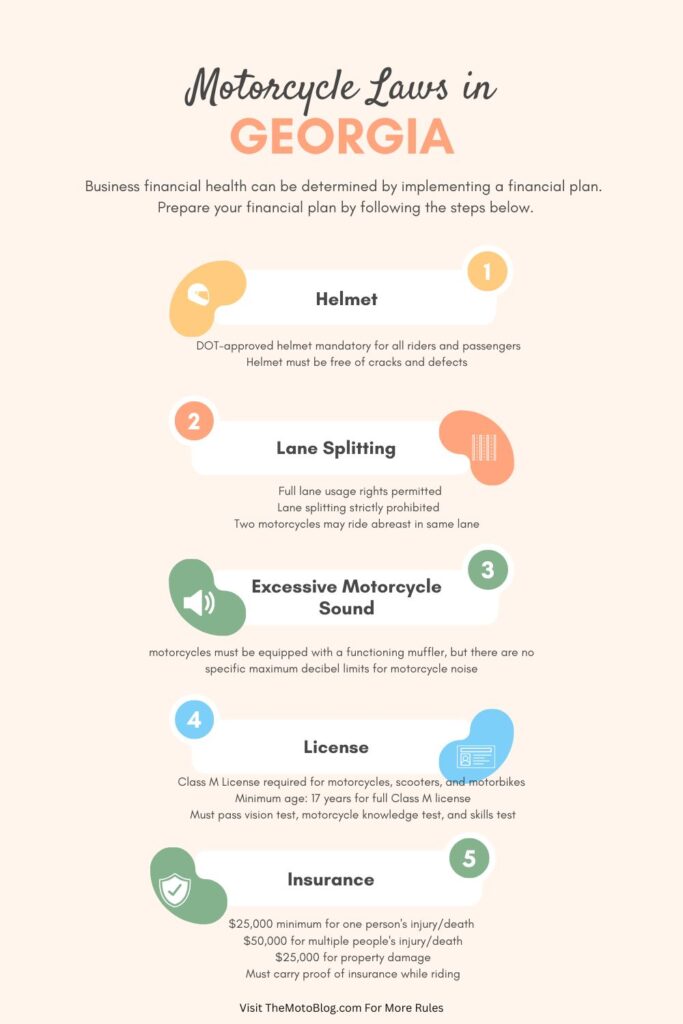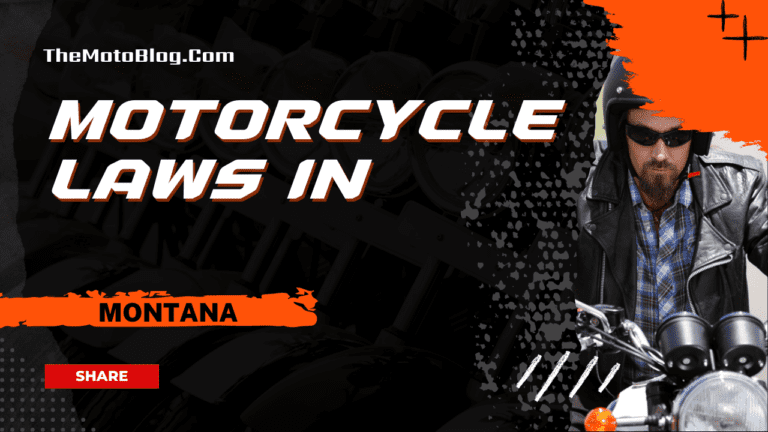Motorcycle Laws in Georgia: A Comprehensive Guide for Riders
Georgia’s motorcycle laws intersect with several neighboring states’ regulations while maintaining its unique requirements. While Alabama’s motorcycle regulations share similar helmet requirements, and Tennessee’s motorcycle laws align on many safety protocols, Georgia enforces distinct rules for its riders. For motorcyclists exploring the Southeast, understanding these regulations is crucial, especially when crossing into South Carolina or Florida, where some requirements may differ.

| Category | Requirements |
|---|---|
| Licensing | • Class M License required for motorcycles, scooters, and motorbikes • Minimum age: 17 years for full Class M license • Must pass vision test, motorcycle knowledge test, and skills test • Documentation needed: Proof of identity, Georgia residency • Class MP (Instructional Permit) available at age 16 |
| Helmet & Safety | • DOT-approved helmet mandatory for all riders and passengers • Helmet must be free of cracks and defects • Eye protection required if motorcycle lacks windshield • Helmet speakers allowed for communication only • Face shield or approved goggles required |
| Operating Rules | • Full lane usage rights permitted • Lane splitting strictly prohibited • Two motorcycles may ride abreast in same lane • Headlights and taillights must be on at all times • Turn signals required for post-1972 motorcycles • Side mirrors required |
| Insurance | • $25,000 minimum for one person’s injury/death • $50,000 for multiple people’s injury/death • $25,000 for property damage • Must carry proof of insurance while riding |
| Vehicle Specs | • Saddle for rider required • Handlebar control mandatory • Maximum three wheels allowed • Brake lights required • License plate must be illuminated • Blue, red, violet, and green lights prohibited |
| Passenger Laws | • No specific age restrictions • Must have designated passenger seat • Passenger must straddle the seat • Passengers must wear DOT-approved helmet • Must have passenger footrests |
| Registration | • Registration with state required • No title requirement for motorcycles • Must carry proof of insurance • Must carry valid Class M license |
| Traffic Laws | • Must follow same traffic laws as other vehicles • Two motorcycles permitted side-by-side • Cannot overtake another vehicle in same lane • Must activate lights at all times |
| Excessive Motorcycle Sound Laws | • motorcycles must be equipped with a functioning muffler, but there are no specific maximum decibel limits for motorcycle noise |
| Penalties | • Helmet violation: Up to $1,000 fine and/or one year jail • Lane splitting fines around $130 • Penalties vary by county |
| Special Cases | • Agricultural three-wheelers exempt from helmet laws • Enclosed cab riders exempt from helmet requirements • Law enforcement exempt from lane-splitting rules |
Licensing Requirements
Operating a motorcycle in Georgia requires proper licensing and documentation. All riders must obtain a Class M license, with the minimum age set at 17 years for full licensure. The licensing process includes passing a vision test, motorcycle knowledge assessment, and practical skills evaluation. Riders aged 16 can obtain a Class MP (Instructional Permit), though they face restrictions on nighttime riding and carrying passengers.
Helmet and Safety Equipment Regulations
Georgia enforces strict helmet laws for all motorcyclists. Both riders and passengers must wear DOT-approved helmets free from cracks or defects. Additional safety requirements include:
- Mandatory eye protection when riding without a windshield
- Communication-only helmet speakers permitted
- Required face shield or approved goggles
Operating Guidelines
The state maintains clear guidelines for motorcycle operation on Georgia roads. While Florida’s motorcycle laws may differ in some aspects, Georgia emphasizes:
- Full lane usage rights
- Strict prohibition of lane splitting
- Permission for two motorcycles to ride abreast
- Mandatory headlight and taillight operation
- Required turn signals for post-1972 motorcycles
Insurance Coverage Requirements
Georgia mandates comprehensive insurance coverage for all motorcyclists:
- $25,000 minimum coverage for single-person injury/death
- $50,000 minimum for multiple-person injury/death
- $25,000 for property damage
- Mandatory proof of insurance while operating
Vehicle Requirements
Motorcycles must meet specific technical requirements:
- Proper saddle configuration
- Handlebar controls
- Maximum of three wheels
- Functional brake lights
- Visible license plate illumination
- Restricted colored lighting
Passenger Regulations
Georgia’s passenger laws focus on safety without age restrictions:
- Designated passenger seating required
- Proper seat straddling capability
- Mandatory DOT-approved helmet use
- Required passenger footrests
Registration and Documentation
Riders must maintain:
- State registration
- Proof of insurance
- Valid Class M license
Traffic Rules and Enforcement
Georgia enforces standard traffic laws with specific motorcycle provisions:
- Standard vehicle traffic law compliance
- Side-by-side riding permissions
- Same-lane passing restrictions
- Constant light operation requirement
Penalties
Violations result in significant consequences:
- Helmet violations: Up to $1,000 fine and potential jail time
- Lane splitting: Approximately $130 fine
- County-specific penalty variations
Understanding Georgia’s motorcycle laws is essential for both residents and visitors enjoying the state’s scenic routes. Riders planning trips to neighboring states should note that while North Carolina’s motorcycle regulations share similarities, each state maintains specific requirements. Those exploring beyond Georgia’s borders can enjoy Tennessee’s scenic motorcycle routes or South Carolina’s popular riding destinations, keeping in mind the varying regulations. Whether you’re a local rider or passing through, adhering to these laws ensures a safe and legal riding experience throughout the Southeast. For those venturing into neighboring states, Florida’s motorcycle regulations and Alabama’s riding requirements may differ in specific aspects, making it important to review local laws before crossing state lines.
Motorcycle Laws in the US By States
If you liked this article, then please subscribe to our YouTube Channel for more Bike Videos. You can also find us on Instagram, Twitter and Facebook.
Disclosure: As an Amazon Associate, I earn from qualifying purchases. Read more about Amazon Affiliate Disclaimer.

Vishwanath Mathpati
I am Vishwanath Mathpati, a full-time Blogger and Motorcyclist from Bidar, Karnataka. I love writing about my Motorcycles Stories and Riding Gears on this blog.
Know More About Me.







